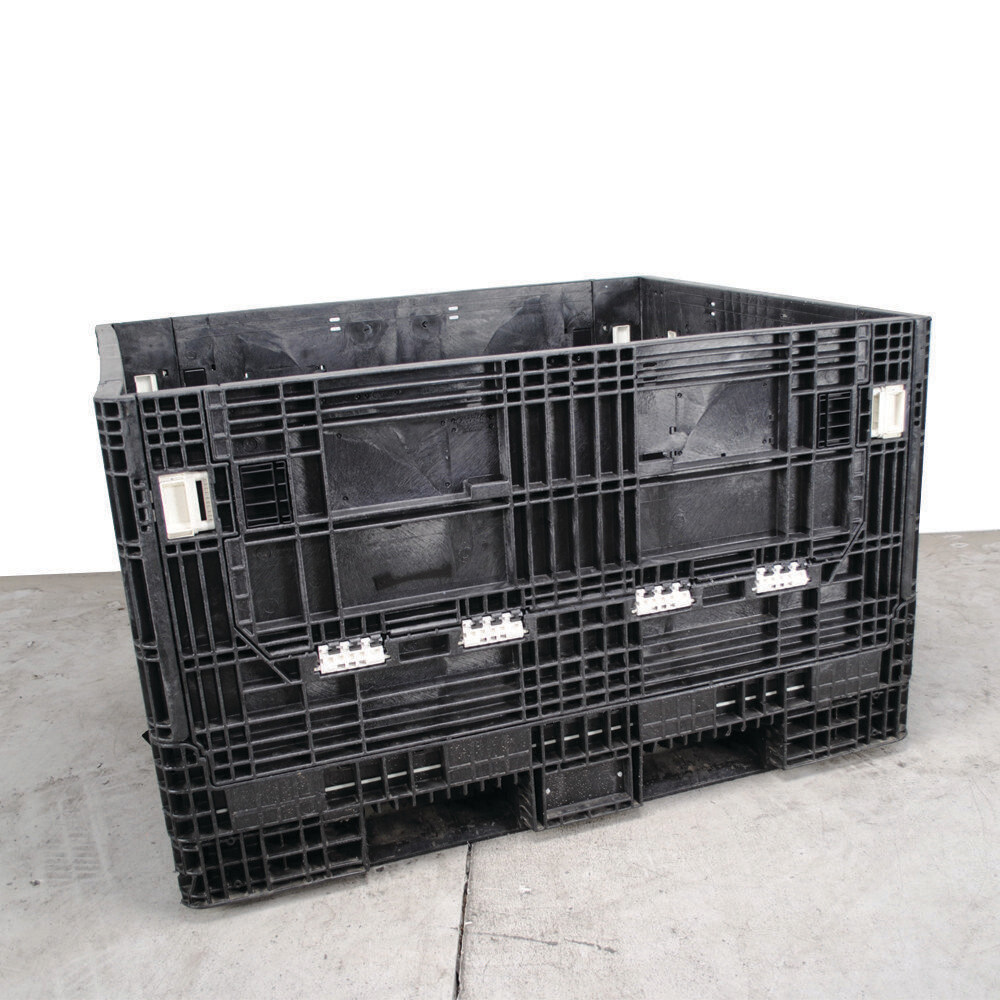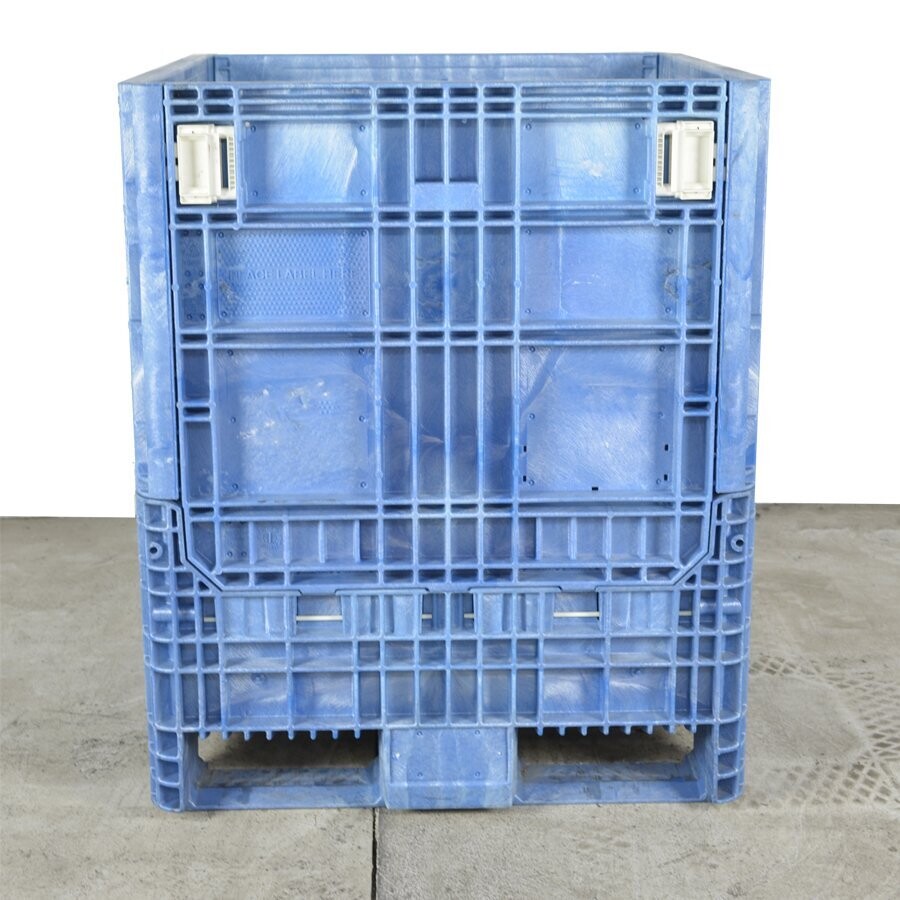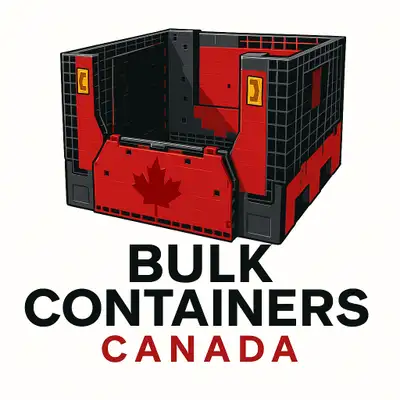Why Mass Containers Are Important for Lasting and Cost-efficient Transportation
Mass containers play an essential function in contemporary logistics. They assist in the reliable movement of large amounts of items, thereby maximizing transportation processes. This method not just reduces prices however also minimizes ecological influence through lower exhausts and waste generation. As industries look for more sustainable practices, the adoption of mass containers is becoming increasingly significant. What implications does this change hold for future logistics and supply chain administration?

The Benefits of Utilizing Bulk Containers in Logistics
Bulk containers change logistics by improving effectiveness and sustainability. These containers permit the transportation of huge quantities of products in a solitary trip, markedly minimizing the number of trips called for. This not just improves procedures yet also reduces labor costs connected with handling, loading, and discharging. Furthermore, mass containers are developed to enhance area usage within transportation cars, guaranteeing that more products can be shipped all at once.
The standardization of bulk containers also simplifies the logistics process. With uniform measurements, they can be conveniently stacked and kept, causing improved stockroom management. In addition, mass containers often include long lasting materials that safeguard contents from damages during transportation, consequently lowering item loss and enhancing overall reliability. As a result, businesses can experience boosted supply chain efficiency, inevitably causing enhanced profitability and customer complete satisfaction. This mix of aspects makes mass containers an important asset in modern logistics.
Environmental Influence: Reducing Waste and Carbon Impact
As industries progressively prioritize sustainability, the adoption of mass containers has actually arised as a key technique for reducing waste and lowering carbon footprints. These containers lessen the usage of product packaging materials, such as boxes and plastic, therefore especially decreasing total waste generation. By consolidating deliveries, mass containers improve transportation effectiveness, enabling even more items to be carried per trip. This reduction in journeys directly correlates with lower greenhouse gas emissions, adding to a smaller carbon impact.
Mass containers can usually be recycled or recycled, even more alleviating environmental effect. The sturdiness of these containers warranties they can stand up to numerous transport cycles, reducing the need for single-use options. used collapsible bulk containers. By enhancing logistics and advertising reliable source use, bulk containers not just support sustainable methods yet likewise encourage markets to align with global ecological goals. Ultimately, their execution shows a dedication to environmental stewardship and liable resource monitoring
Price Savings: Exactly How Bulk Containers Lower Transportation Costs
While numerous business look for means to boost their bottom line, using bulk containers presents a significant possibility for decreasing transportation costs. Bulk containers optimize the quantity of items carried, allowing services to deliver larger amounts simultaneously. This performance reduces the variety of journeys needed, directly decreasing gas costs and minimizing labor expenditures related to loading and unloading.
In addition, mass containers frequently feature streamlined layouts that optimize room utilization within transport lorries. This means fewer empty areas, bring about more effective use of readily available capability. The toughness of mass containers can lower the risk of product damages during transportation, making sure and reducing losses that more goods show up intact.
Enhancing Supply Chain Effectiveness With Bulk Storage Space Solutions
Mass storage space solutions play a necessary role in boosting supply chain performance by maximizing stock management. By combining items into fewer, bigger containers, businesses can substantially lower managing expenses related to frequent transfers and processing. This streamlined technique enables far better monitoring and monitoring of supply, ultimately resulting in enhanced operational performance.
Streamlined Inventory Management
Efficient inventory monitoring is necessary for enhancing supply chain procedures, specifically when companies take on bulk storage options. These services allow businesses to preserve greater stock levels while lessening the regularity of replenishment. By consolidating products right into mass containers, firms can improve their inventory processes, lowering the intricacy connected with tracking numerous smaller sized packages. This approach helps with exact stock counts and improves projecting precision, enabling even more educated decision-making. Furthermore, mass storage services simplify storehouse organization, making it much easier to find and access products when needed. Consequently, companies can achieve a much more efficient supply turnover price, inevitably enhancing total supply chain performance and lowering the probability of stockouts or overstock circumstances.

Reduced Handling Expenses
The application of mass storage space services not just streamlines inventory management however likewise substantially reduces taking care of costs across the supply chain. By combining products right into mass containers, business reduce the requirement for regular handling and transfer in between different storage and transportation units. This strategy cuts down on labor prices connected with loading, dumping, and moving smaller sized bundles. Furthermore, bulk storage space minimizes the frequency of shipments, resulting in reduced transportation costs and decreased gas consumption. Because of this, companies can maximize their logistics procedures, permitting a more efficient appropriation of resources. Eventually, reduced dealing with expenses contribute to improved total supply chain performance, fostering a setting that sustains both sustainability and economic viability.

Versatility of Mass Containers Throughout Different Industries
Numerous industries have distinct requirements for transportation and storage space, mass containers have actually arised as a versatile solution that meets a wide range of demands. These containers, ranging from huge containers to specialized containers, can accommodate varied materials, including liquids, granules, and powders. In the agricultural market, bulk containers facilitate the transport of grains and fertilizers, while the food and beverage market uses them for active ingredients and finished products. The chemical sector counts on mass containers for securely delivering unsafe materials, making certain compliance with safety and security guidelines. In addition, construction companies benefit from mass containers for carrying aggregates and various other materials. Their adaptability reaches various modes of transport, consisting of ships, trucks, and trains, enhancing logistical efficiency. This adaptability not only simplifies operations throughout different fields yet likewise advertises sustainability by minimizing product packaging waste and optimizing space in transportation. As a result, bulk containers play a crucial function in modern-day supply chain management.
Future Trends wholesale Container Use and Sustainability
The future of Get More Info mass container use is increasingly shaped by cutting-edge products growth that enhances sustainability. Furthermore, automation in logistics promises to enhance procedures, minimizing waste and enhancing effectiveness. Embracing round economy techniques will even more change how bulk containers are designed, made use of, and recycled, fostering a much more sustainable transport landscape.
Cutting-edge Products Development
As markets increasingly prioritize sustainability, innovative products growth wholesale containers emerges as a significant factor in improving environmentally friendly transport services. Manufacturers and researchers are checking out biodegradable plastics, recycled compounds, and lightweight steels to reduce environmental effect. These materials not just decrease waste however likewise enhance gas efficiency by decreasing the total weight of containers. Additionally, developments in clever materials, which can adapt to varying problems, enhance the toughness and functionality of bulk containers. The assimilation of these cutting-edge products lines up with round economic climate principles, promoting reuse and recycling. As the need for sustainable techniques grows, the growth of such materials will play an important function in shaping the future of mass container usage in logistics and her latest blog transport.
Automation in Logistics
Considerable advancements in automation are poised to transform logistics and the use of mass containers, improving sustainability in transportation. Automated systems, consisting of drones and independent vehicles, are simplifying the movement of bulk containers, reducing the reliance on typical fuel-powered transportation. These innovations optimize directing and filling procedures, decreasing empty miles and enhancing gas efficiency. In addition, automated inventory management systems improve tracking and monitoring of bulk containers, ensuring far better source allotment and decreased waste. The combination of the Web of Points (IoT) allows real-time data analysis, allowing positive decision-making that straightens with sustainability objectives. As automation remains to progress, it is expected to drive even more technologies wholesale container usage, ultimately supporting more lasting logistics techniques and decreasing the ecological effect of transportation.
Circular Economic Climate Practices
Developments in automation are establishing the stage for a more integrated method to circular economic situation methods in the domain of mass container usage. As markets progressively embrace sustainability, mass containers are being developed for durability and reusability. This change not only minimizes waste but likewise improves source performance. Firms are taking on techniques such as closed-loop systems, where utilized containers are accumulated, refurbished, and reintroduced into the supply chain. In addition, wise technologies track container life cycles, assisting in much better management and reducing ecological effect. The collaboration between makers, logistics providers, and end-users is important in establishing standards for sustainable container use. used collapsible containers. Future trends show a growing emphasis on products that are recyclable and eco-friendly, further click here for info strengthening the circular economy's principles wholesale transportation

Regularly Asked Questions
What Products Are Mass Containers Usually Made From?
Bulk containers are usually constructed from long lasting products such as high-density polyethylene, steel, cardboard, and aluminum. These materials provide protection, flexibility, and toughness, making them suitable for moving various goods in various sectors efficiently.
Exactly how Do I Select the Right Size Bulk Container?
Selecting the ideal size mass container involves assessing the volume of materials to be moved, considering managing devices compatibility, and evaluating storage room demands. Proper dimension assurances performance in transport and reduces waste throughout shipment.
Are Bulk Containers Reusable or Recyclable?
Mass containers are typically recyclable, made for several trips, improving sustainability. Numerous can likewise be reused, depending on the products made use of. Picking recyclable alternatives further reduces and supports environmental goals waste in transport methods.
What Security Regulations Apply to Bulk Container Transport?
Safety laws for bulk container transportation include conformity with the Division of Transport standards, proper labeling of hazardous materials, architectural honesty assessments, and adherence to weight restrictions to assure safe handling and avoid accidents during transportation.
Just How Can Organizations Transition to Utilizing Mass Containers Efficiently?
Services can transform to bulk containers by assessing present logistics, educating personnel on handling, investing in suitable devices, enhancing supply monitoring, and working together with vendors to ensure compatibility and effectiveness throughout the supply chain.
As sectors increasingly focus on sustainability, the fostering of bulk containers has actually arised as a key technique for decreasing waste and reducing carbon footprints. By consolidating products right into mass containers, firms can enhance their inventory procedures, reducing the complexity associated with tracking multiple smaller sized bundles. As industries increasingly focus on sustainability, ingenious products growth in bulk containers arises as a significant element in enhancing green transportation remedies. Automated systems, including drones and self-governing lorries, are simplifying the movement of mass containers, reducing the reliance on traditional fuel-powered transport. In addition, automated inventory administration systems enhance monitoring and monitoring of mass containers, guaranteeing much better resource allotment and reduced waste.